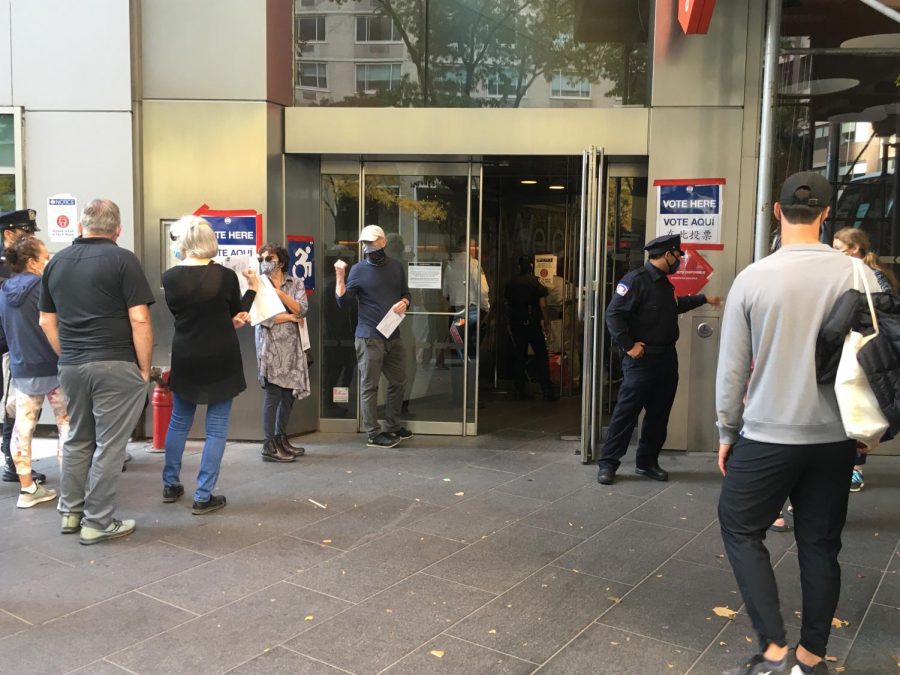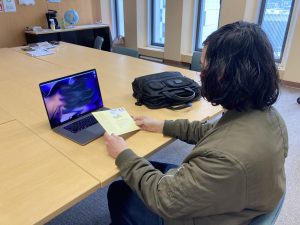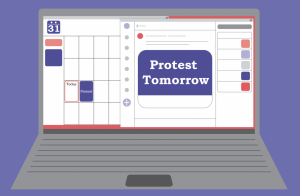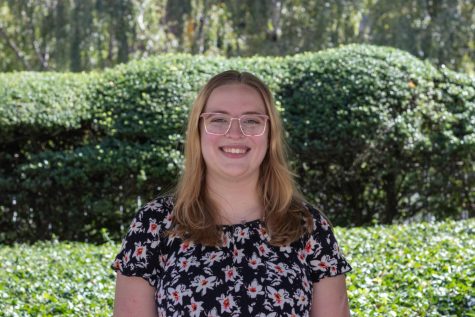Challenges of Voting During a Pandemic
Students discuss voting for the first time, the candidates and mail-in voting
The David Rubenstein Atrium is one polling place near the Fordham Lincoln Center campus and offers both in-person voting and a ballot drop box. Since the pandemic has changed the voting experience this year, students face choices on how they wish to vote.
October 28, 2020
The 2020 election is a very different election compared to previous years, as the ongoing pandemic has changed the ways that people are casting their ballots.
First-time voters and college students must choose how they want to vote this year while navigating the threat of COVID-19 and trying to stay safe.
The Candidates
In an anonymous political survey of 211 Fordham students conducted by The Observer, 86% of those planning to vote are casting their ballot for Joe Biden and Kamala Harris, and 8% are voting for Donald Trump and Mike Pence. Of the respondents, 5% said they are undecided and 1% preferred a variety of third-party candidates.
Although the majority of students are voting for one of the two major party candidates, 87.7% said that they are not in favor of the two-party system.
“We need to move to a ranked choice voting system so that people can vote for candidates that truly support their values without compromising their vote,” an anonymous student responded in The Observer’s survey. “For example, I would vote for the Green Party because they better fit my values, but in the current system they do not have a chance of winning so I will be voting for Biden/Harris.”
Joe Biden is still not the candidate that a lot of the Fordham community, frankly, probably wanted to see.” Emma Kossoy, FCLC ’22
With the electoral college, the person with the majority of votes in a state takes all of the delegates. The process is different in Maine and Nebraska, where they assign delegates on a proportional system.
When asked how confident they were that the most pressing issues would be addressed by their preferred candidate in the next four years, 38.4% of students said they are unsure, while 27.5% said they are slightly doubtful, and 14.7% completely doubtful.
Many students expressed their support for Biden as the superior option over Trump, but they did not show strong support for his policies.
“Joe Biden is still not the candidate that a lot of the Fordham community, frankly, probably wanted to see, but it’s better to fight a neoliberal oligarchy than it is to fight a straight-up fascist,” Emma Kossoy, Fordham College at Lincoln Center (FCLC) ’22, said.
First-time Voters
The experience of voting during a pandemic is difficult to navigate, especially for first-time voters.
A first-time voter and staff writer for The Observer, Gabriel Garcia, FCLC ’23, is currently undecided on who to vote for in the upcoming election but plans on voting for a third-party candidate.
“Since I don’t agree with either Trump or Biden … I don’t plan on voting for either of those two candidates,” Garcia said. “So, I’m basically thinking of what third-party candidate I want to vote for.”
In the survey, 1% of students revealed that they, too, were planning on voting for a third-party candidate.
“I don’t feel incredibly confident in either candidate.” Landis Hall, FCRH ’24
Landis Hall, Fordham College at Rose Hill (FCRH) ’24, had previously only voted in the 2020 presidential primary. He said that he will be voting for Biden as the lesser of two evils, not because he identifies with Biden’s political beliefs.
“I don’t feel incredibly confident in either candidate,” Hall said. “Neither of them really excite me, but while both Biden and Trump are old and out of touch with what’s important to my generation, I still feel much more confident in Biden’s ability to address climate change and the pandemic.”
Hall had hoped that he would be able to vote in person for his first general election, but is unable to because of the pandemic and distance constraints — he is living on campus this semester but is registered in Tennessee.
“Of course I would have wanted to vote in person, but I understand that because of the pandemic voting by mail is the most responsible option,” Hall said.
Mail-in Voting
With the coronavirus pandemic still surging, many states have expanded mail-in voting. However, with the recent problems with the United States Postal Service and the constant remarks that mail-in voting will lead to a fraudulent election from the president, many students are worried that their votes will not be counted.
In the political survey, 56.6% of students said they will vote by mail, compared to 32.3% who will vote in person. Even without the pandemic, college students are more likely to vote by mail because they live far from home. In the fall 2020 semester, between both the Lincoln Center campus and Rose Hill campus, there is a total of 9,399 students. Just over half of these students, 4,927 are from U.S. states and territories other than New York.
When students who are planning to vote by mail were asked how confident they feel about their vote being counted, 37% of students said they were fairly confident and 29.1% answered that they were unsure.
Some students are choosing to vote by mail due to the pandemic but are still afraid that their vote won’t be counted.
“I think part of it is also specifically this year — I wouldn’t want to endanger other people who have no other choice but to vote in person.” Emma Kossoy, FCLC ’22
“I mean, I’m a young person with a relatively low health risk, but I still don’t super love exposing myself to outside risks,” Kossoy said. “It just kind of felt like the safest and most reasonable option.”
Kossoy explained that, this year, every registered voter in New Jersey received a mail-in ballot automatically. Kossoy revealed that if voting in person was the safest option, she would have chosen to do that.
“I think part of it is also specifically this year — I wouldn’t want to endanger other people who have no other choice but to vote in person,” Kossoy said. “So even if it was an option, it just feels like it’s best to have as few people as possible do that.”
Some students are worried about their vote not being counted due to their experiences with the 2020 primary or earlier elections. Kathryn Echele, FCLC ’23, explained that despite requesting her absentee ballot on time for the Missouri primary, she never received it.
“I tried to vote absentee for the Presidential primary last semester, but I never received my ballot. Thinking that was strange, I emailed my local board of election about it. They said my application must have come in too late,” Echele said. “The wording of their email was vague indicating to me they didn’t know what happened, even though I mailed it on time.”
Echele explained that she learned that the same thing happened to her friend, causing her to contact her secretary of state and congressional representative.
“Ultimately, no acknowledgement of an oversight or system correction was made,” Echele said. “I am someone who takes voting very seriously, so this experience was very upsetting for me.”
Other students are worried because of bad experiences with mail-in voting during the primaries. This happened to students registered in New York when many didn’t receive their ballot until after election day.
“Pay careful attention to all instructions on the ballot while filling it out, and track their ballot online to make sure it was received by their state.” Corina Fuentes, FCLC ’21
“Texas sent me my primary ballot in November of 2019 AFTER it was due back, I was straight up disenfranchised,” an anonymous student responded to The Observer’s survey.
Corina Fuentes, FCLC ’21, has voted by mail in four previous elections and believes that it is just as trustworthy as voting in person. For students who are voting by mail for the first time, Fuentes recommends that they “pay careful attention to all instructions on the ballot while filling it out, and track their ballot online to make sure it was received by their state.”
The election may not be what people imagined, but it is quickly approaching. With the increase in mail-in ballots, many states are also allowing ballots to arrive after Election Day as long as they are postmarked by Election Day. Due to this, it is extremely likely that the election will not be officially called until after Nov. 3.
“As demographics change, voter suppression has become a favored tactic of those who fear their new constituents will seek to replace them — and the victims of this are almost always on the left,” an anonymous student said. “Mail-in voting is an imperfect solution, but far better than the alternative.”













